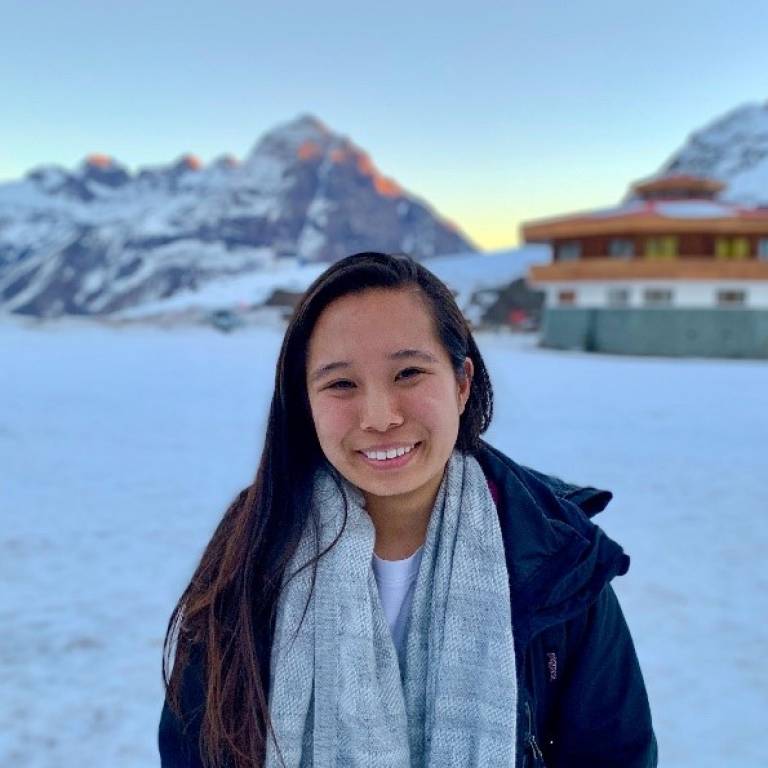Describe your time at UCL in three words: Self-reflection. Connection. Curiosity.
Evelyn Wong
MPhil Division of Medicine (Neural Computation Lab)
Los Angeles, California, USA
What attracted you to UCL?
What attracted me most to UCL was the breadth of neuroscientific research across various departments—specifically the work of Dr. Michael Hausser, a leading pioneer in neurotechnology and neural computation. I really admire his philosophy in research, which is that the questions we ask about the world around us shouldn’t be limited to the technologies available to us.
A lot of his work focuses on creating new technologies for understanding the mammalian brain and neuropsychiatric disease, so that we can advance our ability to probe the human mind rather than searching for an answer or cure within the confines of our existing toolbox.

What aspects of your studies do you enjoy the most?
Due to the nature of the research degree I am pursuing, I love the freedom I have in designing my own “curriculum,” depending on the skills I would like to improve on—whether it’s computational modelling, surgical techniques, data analysis, or entrepreneurship. While it has been a steep learning curve juggling the various skills I would like to learn, I enjoy walking up in the morning and being able to tackle a different topic depending on my project and my interests on any given day.
What makes you most proud to be a UCL student?
I am proud to be part of a group of lab mates who are incredibly brilliant and passionate about uncovering ground-truth mechanisms of neural circuits and dendritic computation. I have the privilege of interacting with and learning from leading scientists in almost every corner of neuroscience—from those studying the visual cortex to dendrites, those building neural network models of single neurons or designing virtual reality sets for mice.
What are some of the most interesting things you have done, seen, or got involved with while at UCL?
While at UCL, I have been super involved with the competitive women’s basketball team, where I have the privilege of serving as co-captain of my team. Basketball has a special place in my heart. It has been the constant throughout my life—from streetball growing up in East Los Angeles to varsity basketball in high school, to club ball in college / while working in Buenos Aires, to now. It’s such a great opportunity to learn about the stories of the people I play with, and my experience at UCLWB (UCL Women’s Basketball) has been one of the coolest ways I’ve found to get to know both local and international students.
What advice would you give to a student considering UCL?
UCL has so many incredible opportunities—academic and extracurricular—that allow you to find your niche and pursue your professional and personal interests. My biggest advice is this: while it’s true that academics is important to your future career, most of the learning and growth occurs outside of the classroom—through conversations with others, exploring societies, and volunteer work. There’s no better place than London to do this, where students hail from all corners of the world. Even if you’re in introvert, take advantage of this opportunity to learn about where your classmates are coming from!
What are your future ambitions and how do you think that being a UCL student will help you get there?
I am interested in the intersection between neuroscience, technology, and refugee health. (My parents grew up in Vietnam during the war and lived in a refugee camp in Thailand before coming to the US). I want to learn the language of technological development, so that I can translate this knowledge into new tools that are accessible in the refugee health setting. I am currently working with Dr. Michael Hausser, who spearheaded the creation of a technology called all-optical interrogation for simultaneously recording and manipulating neural activity in order to understand their role in behavior. My hope is that the skills I gain from working in the Neural Computation Group will be useful in my future career as a physician-neuroscientist, building tools that can help us shed light on brain function and psychiatric disorders. Beyond the scientific drive to work at this niche intersection of neurotechnology and its clinical implications, as someone who wants to serve the global community, I think it’s super important and exciting to engage in continuous dialogue with other scholars who will be scientists, and policy makers, and future government heads to solve these complex issues in healthcare.
Describe your time at UCL in three words.
Self-reflection. Connection. Curiosity.
 Close
Close

